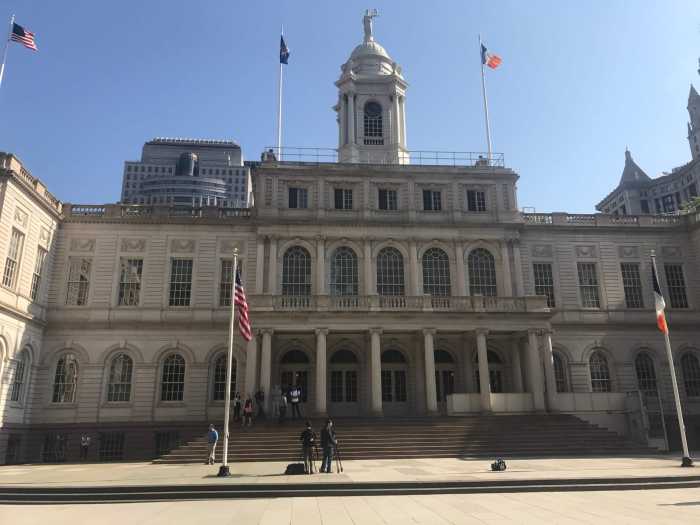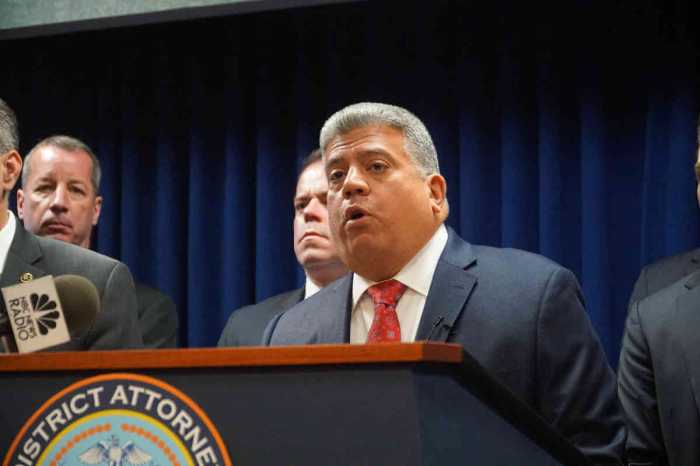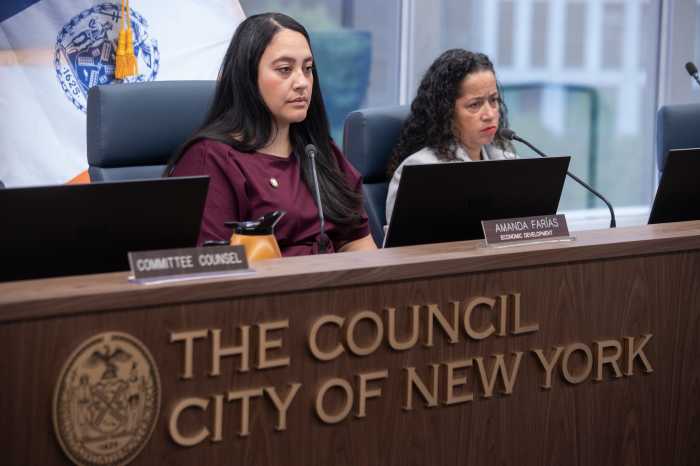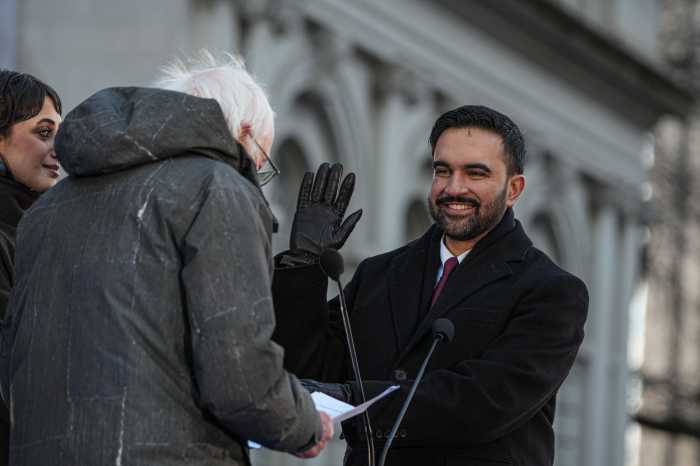Unions, long leaders on progressive issues, uneven in responding
Organized labor, long an ally of the queer rights movement in the U.S., is only slowly signing on to the battle against the Federal Marriage Amendment and in support of same-sex civil marriage, but some gay community and labor activists said that the nation’s unions will eventually back the queer community.
On March 12, the statewide gay lobbying group held a press conference on the steps of City Hall to speak out against the amendment to the U.S. Constitution. That amendment would bar lesbian and gay couples from marrying and it might prevent other legal arrangements, such as domestic partnerships and civil unions.
While some seven union locals joined the press event, ESPA was careful to invite those that it knew would say yes.
“The Pride Agenda’s goal was to show a broad depth of support so we went to people who were the low hanging fruit.” Van Capelle said. “I knew which unions I would be able to approach and get an answer from and which unions would require a long conversation.”
That “long conversation” may be necessary to get labor unions to support marriage for lesbian and gay couples. Trade unionists may see marriage as a social issue and having less to do with the workplace, the traditional labor concern.
Typically, union leaders respond to the demands of their members. Some union members, like many other Americans, may oppose gay marriage or they may not see it as their issue.
“I don’t think this is going to get to the top of the list of labor unless they hear from their members,” Finnegan said. “I doubt that they are going to hear from a lot of their members.”
In New York, ESPA is recruiting union members to talk to their leadership. The campaign, called Pride In My Union, will start those discussions.
“What moves labor bureaucracy is members talking about an issue,” said Van Capelle, who worked in organized labor for eight years prior to taking the helm at ESPA. “I don’t think there is a union out there that doesn’t need a level of education about this issue. Labor unions don’t think about gay marriage on a daily basis.”
Organized labor has been at the forefront of a number of queer issues. The Village Voice was the first employer, public or private, in the nation to grant domestic partnership benefits. That gain came as part of a union contract in 1982.
Trade unions were reliable allies in fighting the 1978 Briggs initiative in California that would have banned lesbian and gay teachers in that state’s public schools as well as later anti-gay initiatives in Oregon and Washington.
In 1983, the national convention of the AFL-CIO gave its unanimous endorsement to gay right laws well ahead of most states and cities that now ban discrimination based on sexual orientation.
Jeremy Bishop, acting director of Pride At Work AFL-CIO, said he was seeing some union movement on both the marriage and amendment issues, but it is slow.
“We are beginning to see that,” he said. “With marriage, it’s such a scary issue that what we are trying to do is demystify the issue itself.”
Pride At Work is a “constituency group” within the AFL-CIO, the umbrella group that represents more than 13 million members in roughly 90 constituent unions.
Local labor councils that represent groups of union locals in Seattle and San Francisco have passed resolutions approving of same sex civil marriage.
At least seven unions, including SEIU and the American Federation Of State, County and Municipal Employees (AFSCME), and the Seattle labor council have opposed the marriage amendment. AFSCME, with 1.4 million members, and SEIU, with 1.6 million members, are the two largest unions in the AFL-CIO.
In this election year, the AFL-CIO is focusing on jobs and healthcare as its main issues, according to Bishop. Gay marriage may be seen as a “polarizing” wedge issue unions would likely avoid.
In Massachusetts, where the state is expected to start issuing marriage licenses to gay and lesbian couples on May 17, SEIU has been particularly supportive.
In January, the SEIU Massachusetts State Council, which is made up of five locals representing 85,000 members, endorsed the court ruling that ordered same-sex marriage in that state. The council also opposed a state constitutional amendment that would overturn that decision.
“I was happily surprised,” said Celia Wcislo, president of SEIU Local 2020 and an out lesbian. “I thought it would be more of a struggle… I was surprised at how many of the heads of the locals understood that people should have the right to marry.”
The Council has twice sent its resolution to all the members of the state Legislature. Still, getting more elements of the labor movement to move on the issue requires work.
“Taking a position, as a union, gets you into a very divisive issue,” Wcislo said. “People, if they are not forced to deal with it, they won’t touch it.”
Wcislo noted that the positions of union leaders across the state had shifted dramatically from a few years ago when they might not have backed even civil unions.
“I think even in Massachusetts the fact that they have come out supporting civil unions that is a huge jump,” she said. “I don’t think I have a labor leader in the state who would say no to civil unions.”
We also publish:





































